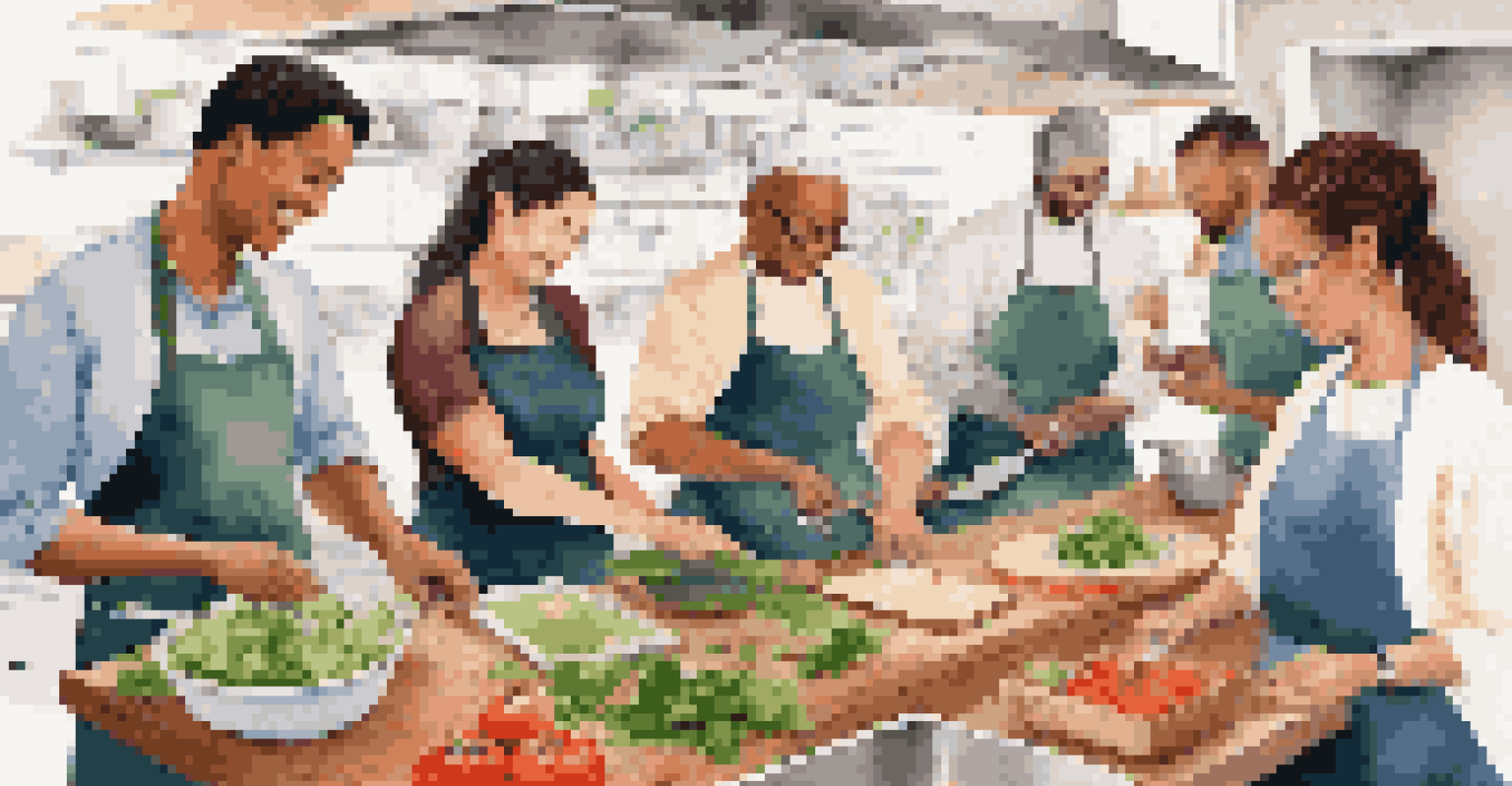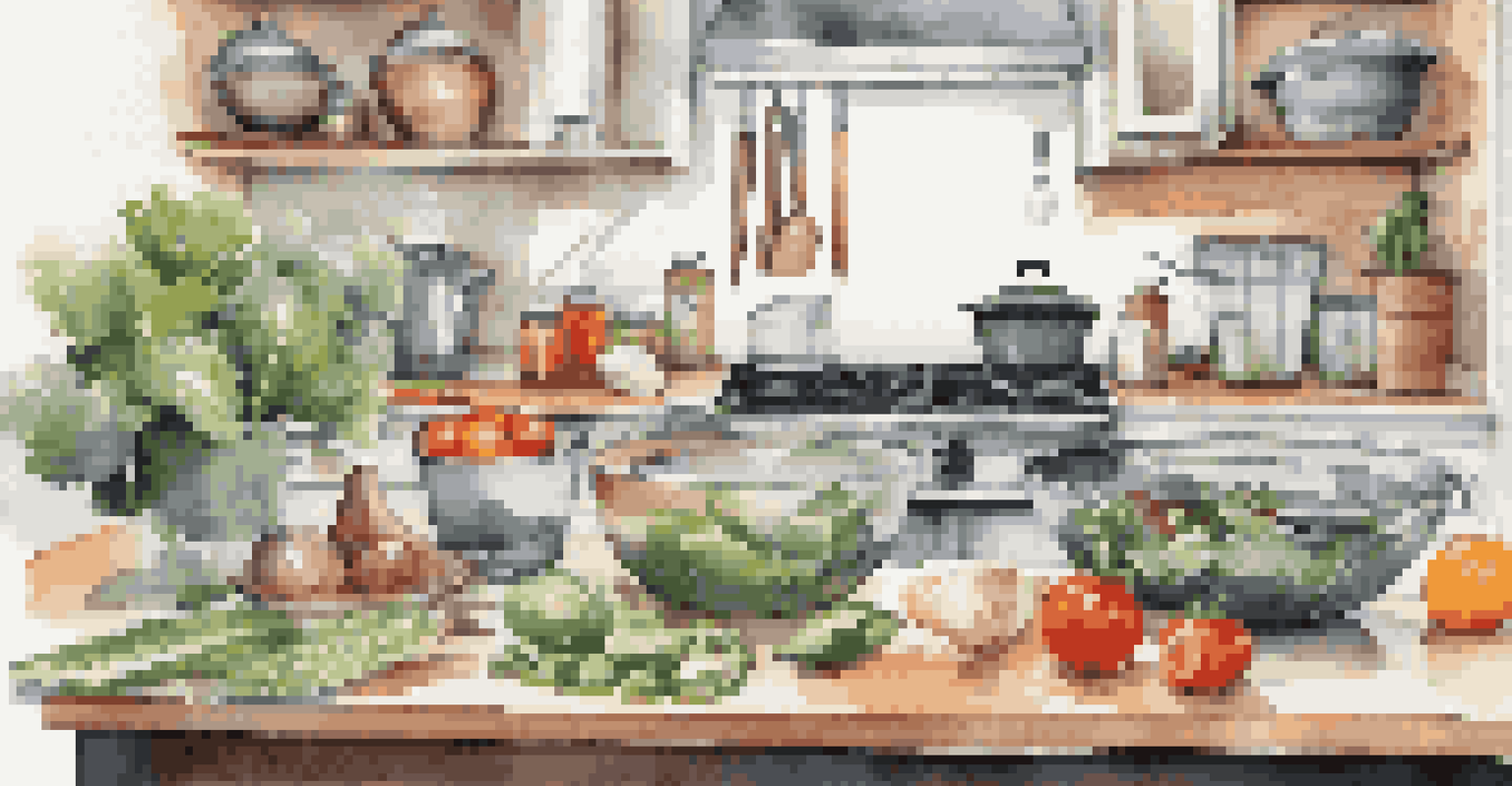Healthy Cooking Techniques: Hands-On Classes for Better Meals

The Importance of Healthy Cooking Techniques
Healthy cooking techniques play a pivotal role in creating nutritious meals that enhance our well-being. By understanding how to prepare food in a wholesome way, you can significantly reduce the amount of unhealthy fats, sugars, and processed ingredients in your diet. This not only fosters better health but also leads to a more enjoyable eating experience.
Cooking is like love. It should be entered into with abandon or not at all.
Moreover, mastering these techniques empowers you to make conscious choices in the kitchen. Whether you’re roasting vegetables, steaming fish, or using whole grains, these methods can transform ordinary meals into delicious and nourishing dishes. The result? You feel better, both physically and mentally.
Incorporating healthy cooking techniques into your routine can also save you money and time. By cooking at home, you have control over what goes into your meals and can avoid the hidden costs of dining out or purchasing pre-packaged foods.
Benefits of Hands-On Cooking Classes
Participating in hands-on cooking classes offers a unique way to learn healthy cooking techniques. These classes provide a supportive environment where you can gain practical experience while receiving guidance from skilled instructors. This blend of learning and doing helps reinforce the skills you'll take away.

Additionally, hands-on classes often focus on practical skills like chopping, seasoning, and cooking methods that are essential for creating healthier meals. You'll not only learn about ingredients and nutrition but also how to combine flavors and textures to make your dishes appealing. This experiential learning can be more effective than reading a cookbook alone.
Healthy Cooking Enhances Well-Being
Mastering healthy cooking techniques leads to better nutrition and a more enjoyable eating experience.
Another significant benefit is the opportunity to connect with fellow cooking enthusiasts. Sharing tips, techniques, and even laughter with others can make the learning process enjoyable and memorable, creating a supportive community around healthy cooking.
Key Healthy Cooking Techniques to Learn
When you enroll in a cooking class, you’ll likely encounter a variety of healthy techniques. Some key methods include steaming, roasting, grilling, and sautéing, which help retain nutrients while enhancing flavor. Each technique has its own merits and can be applied to different types of ingredients.
The only real stumbling block is fear of failure. In cooking, you’ve got to have a what-the-hell attitude.
For example, steaming vegetables preserves their vibrant color and nutrients, making them a delicious addition to any meal. Roasting, on the other hand, can bring out the natural sweetness in foods like carrots or sweet potatoes, making them irresistible sides. Learning these techniques expands your culinary toolkit and boosts your confidence in the kitchen.
Moreover, mastering healthy cooking techniques encourages creativity. You can experiment with different ingredients and flavors, transforming simple meals into culinary masterpieces without compromising on health.
Choosing the Right Cooking Class for You
With so many cooking classes available, it’s essential to choose one that aligns with your goals and interests. Consider what you want to achieve: Are you looking to learn specific healthy cooking techniques, or do you want to explore a broad range of culinary skills? Identifying your objectives will help narrow your options.
Look for classes that emphasize hands-on learning and feature instructors with expertise in healthy cooking. Reviews and testimonials can provide insights into the class experience and the effectiveness of the instruction. It’s also worth checking the class size; smaller groups often lead to more personalized attention and a better learning environment.
Hands-On Classes Boost Skills
Participating in hands-on cooking classes provides practical experience and fosters a supportive community.
Lastly, consider the class format. Some classes are in-person, while others may be online. Finding a format that fits your lifestyle will ensure that you can fully engage and benefit from the learning experience.
Essential Equipment for Healthy Cooking
Having the right tools in your kitchen can make a significant difference when it comes to healthy cooking. Essential equipment includes sharp knives, cutting boards, steamers, and non-stick pans, which can help you execute techniques effectively and safely. Investing in quality tools not only enhances your cooking experience but also encourages you to try new recipes.
Additionally, consider appliances like blenders and food processors, which can simplify meal prep for smoothies, soups, and sauces. These gadgets can save you time and effort, allowing you to focus on flavor and nutrition rather than tedious tasks. A well-equipped kitchen makes cooking enjoyable and efficient.
Lastly, don’t underestimate the importance of measuring tools. Precision in cooking can affect the outcome of your meals, especially when it comes to baking or creating dressings. Having measuring cups, spoons, and a kitchen scale can help you maintain consistency in your recipes.
Healthy Meal Planning for Success
To complement your cooking skills, effective meal planning is essential for maintaining a healthy diet. Start by outlining your meals for the week, considering both nutritional balance and variety. Planning ahead helps you make the most of your cooking classes, ensuring you apply what you've learned to real-life situations.
When meal planning, incorporate seasonal produce and whole foods to maximize taste and nutrition. This not only keeps your meals exciting but also supports local farmers and reduces your environmental footprint. A well-thought-out meal plan can lead to healthier choices and reduce the temptation to opt for fast food.
Meal Planning Supports Healthy Eating
Effective meal planning helps maintain a balanced diet and encourages the use of seasonal, nutritious ingredients.
Lastly, be flexible with your meal plans. Life can be unpredictable, and it's perfectly okay to swap meals or adjust recipes based on what you have on hand. Embracing flexibility will make healthy cooking feel less like a chore and more like an enjoyable part of your lifestyle.
Continuing Your Healthy Cooking Journey
Once you've taken a cooking class and learned healthy techniques, the journey doesn't end there. It's essential to keep practicing and experimenting in the kitchen. The more you cook, the more comfortable you'll become with various methods and ingredients, allowing your skills to flourish.
Consider joining online communities or local groups focused on healthy cooking. Sharing recipes and experiences with others can provide inspiration and support as you continue your culinary journey. Plus, it’s a great way to discover new ideas and techniques that you might not have encountered in class.

Finally, don’t forget the importance of reflection. Take note of what works well for you and what doesn’t. Adjust your approach based on your experiences, and remember that healthy cooking is a personal journey that can evolve over time to suit your tastes and lifestyle.